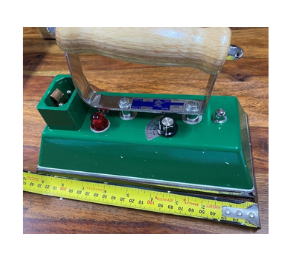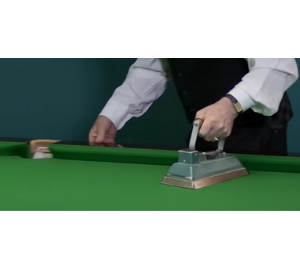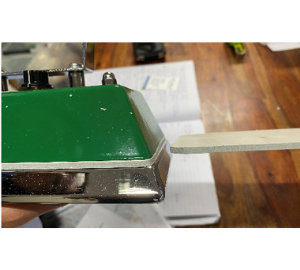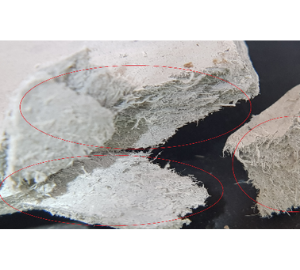Asbestos in Billiard Table Irons and Stands
Purpose
This safety alert provides information about the potential presence of asbestos in the insulation layer of hand-held billiard table irons and associated iron stands, from the People’s Republic of China (China). Online sellers of these items exist in China, India and Taiwan. The item identified in Australia was imported from a supplier in China. A similar but not identical item, with no asbestos, is marketed from the United Kingdom.
Figure 1: Billiard table iron with (white coloured) asbestos insulating layer,
visible between the green housing and lower steel plate.
Background
In December 2020, the WA Department for Mining, Industry Regulation and Safety (DMIRS) were alerted to the presence of chrysotile asbestos in irons imported to Australia. The iron stand on which the iron rests, also contains an insulating layer with asbestos.
Product description
Just over 24cm in length, the hand-held iron is designed to flatten the cloth on billiard tables. A range of types and sizes are commercially available. Those manufactured in countries where asbestos is not banned are likely to contain chrysotile asbestos.
Irons imported with asbestos are prohibited imports. The irons maybe lawfully imported without the asbestos layer.
Figure 2: Image shows use. The model shown is not the affected iron.
Figure 3: Insulating layer in situ.
Figure 4: Close up of insulating layer material.
Asbestos in imported products
While asbestos has been prohibited in Australia since December 2003, in some countries it is still used in manufactured products. Certification of asbestos-free goods from some overseas manufacturers have been found not to meet Australian requirements. The importation, manufacture, supply, sale and use or reuse of asbestos and asbestos-containing products is not permitted, except under very limited circumstances. Some supplier countries may classify goods with low levels of asbestos as ‘asbestos-free’. In Australia, any level of asbestos is prohibited for import or use.
Risk control
The design of the irons typically negates the need for maintenance during the life of the equipment. During normal use there should be little risk of asbestos fibre release. If the iron wears over time, however, there may be a risk of exposure. Owners or users of the identified billiard table irons are advised not to undertake any maintenance, repairs or modifications. They should contact the Australian supplier for clarification and/or seek the guidance of an asbestos professional.
Action Required
- Importers must ensure they do not import asbestos into Australia. They need to be aware of the varying definitions and standards applied in the country of origin and/or supply and ensure they receive adequate evidence of non-asbestos materials used by the manufacturer. A declaration of no asbestos from the overseas supplier, on its own, is not acceptable evidence.
- When a risk is identified at the border, the ABF will require assurance from the importer, in the form of documentary evidence, that the goods do not contain asbestos. A test report from a NATA accredited laboratory (or equivalent international laboratory) showing no detectable asbestos is the best form of assurance. If adequate assurance is not provided, importers will face delays and be responsible for costs incurred when the goods are held at the border for the purposes of sampling and testing. See the ABF website for further information.
- Retailers that might be in possession of the affected irons or might have sold the irons on to consumers, should contact their local Work Health Safety (WHS) regulator for advice. Contact details are provided in the table below.
- If you are concerned you have purchased an affected billiard table iron, you should first check the recalls information from the Australian Competition and Consumer Commission via: https://www.productsafety.gov.au/recalls. Your supplier could be contacted for further information and assurances if they are not part of the current recall.
- If a consumer wish to dispose of equipment they believe may contain asbestos, they should take it to a licensed facility that handles hazardous waste. Further information on the disposal of asbestos waste may be obtained from local government authorities, the relevant environmental protection authority or waste disposal authority in your state or territory.
- Further information about the recall
Where do I get advice?
If unsure what to do, contact your State/Territory/Commonwealth WHS regulator:
Jurisdiction |
Regulator |
Contact Details |
Website |
|
Cwealth |
Comcare |
1300 366 979 |
|
|
QLD |
Workplace Health and Safety Qld |
1300 362 128 |
|
|
QLD |
QLD Gov Asbestos page |
13 74 68 |
|
|
ACT |
WorkSafe ACT |
02 6207 3000 |
|
|
ACT |
ACT Gov Asbestos page |
13 22 81 |
|
|
NSW |
Safework NSW |
13 10 50 |
|
|
NSW |
NSW Gov Asbestos page |
13 10 50 |
|
|
NT |
Worksafe NT |
1800 019 115 |
|
|
NT |
NT Gov Asbestos page |
1800 019 115 |
|
|
SA |
SafeWork SA |
1300 365 255 |
|
|
SA |
SA Gov Asbestos page |
1300 365 255 |
|
|
TAS |
Worksafe TAS |
1300 366 322 |
|
|
VIC |
Worksafe VIC |
1800 136 089 |
|
|
VIC |
Vic Gov Asbestos page |
1800 136 089 |
|
|
WA |
WorkSafe WA |
1300 307 877 |
|
|
NZ |
WorkSafe NZ |
+64 0800 030 040 |
This Alert has been developed by the Heads of Workplace Safety Authorities (HWSA) Imported Materials with Asbestos Working Group, whose membership comprises representatives from: Australian Border Force, Asbestos Safety and Eradication Agency, Attorney General’s Department, Australian Competition & Consumer Commission, New Zealand Customs Service, Comcare, Safe Work Australia, SafeWork NSW, SafeWork SA, NT WorkSafe, Workplace Health and Safety Queensland, WorkSafe ACT, WorkSafe Tasmania, WorkSafe Victoria and WorkSafe WA, WorkSafe NZ.






